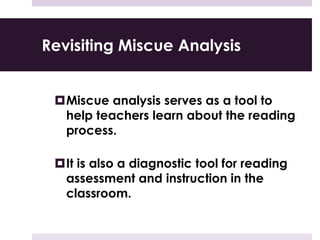This document provides an agenda for an in-person workshop on literacy and language teaching. It includes:
1. An introduction where participants will sign in, get name tags, and sit with their assigned groups.
2. The agenda includes discussing miscue analysis, retrospective miscue analysis, and choice book groups meeting to finalize plans.
3. Sections on revisiting miscue analysis, using miscues to gain insight, a reader's comprehension depending on many factors, and the complete miscue analysis process.
4. Instructions and examples for conducting specific components of miscue analysis, including the reading interview, oral reading, retell, recording data, and analyzing patterns.

































